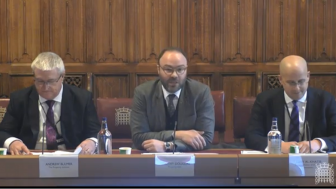 Rental reforms being introduced by the government are “counter-productive” and will drive decent landlords from the market while pushing up costs faced by tenants, it was warned at Westminster yesterday
Rental reforms being introduced by the government are “counter-productive” and will drive decent landlords from the market while pushing up costs faced by tenants, it was warned at Westminster yesterday
The Second Reading of the Renters’ Rights Bill in the House of Lords took place on Tuesday, sparking lively debate, with Conservative shadow housing minister Baroness Scott of Bybrook accused the government of rushing through legislation “without any care for the repercussions”.
“Whilst the government may have good intentions, they will drive landlords from the market, reducing choice and putting up rent for the tenants they seek to protect,” said Baroness Scott.
She pointed out 45% of landlords owned one property, while another 40% owned between two and four.
Lady Scott continued: “In many, if not most cases, these are not professional landlords.
“To expect them to be able to cope with all the costs and burdens placed on them by this Bill is at best naive.
“Many decent landlords and safe quality homes will leave the rental market as a result.”
She added: “The government are rushing it through without any care for the repercussions that will reverberate throughout the sector.”
But Labour housing minister Baroness Taylor of Stevenage argued the far-reaching changes were much needed, ensuring tenants can “put down roots in their communities” and enjoy the same stability as homeowners.

Commenting, after the Second Reading of the Renters’ Rights Bill in the House of Lords, Timothy Douglas, head of policy and campaigns at Propertymark, said: “As anticipated members of the House of Lords delved into the detail of the Renters’ Rights Bill and discussed the intended and unintended consequences it will bring. Importantly, many Peers outlined key changes to property standards and the challenges on local authority enforcement drawing attention to the vital role letting agents will play in ensuring education and compliance to tenants and landlords.
“Disappointingly, some Peers have fallen into the trap of not understanding the costs and taxes impacting landlords and seeing rent control as an additional measure to tackle affordability issues in the private rented sector. Similar policies have failed in Scotland and must be, at all costs, avoided by the UK government.
“Sensible amendments were talked about to support student renters, much needed clarity on court reform and the implementation timeline, tackling short term lets and local authority funding as well as practical application of the grounds and amending deposit rules to allow more tenants to rent with pets. These are the areas that the UK government must focus their attention during the remaining stages of the Bill.”
The Law Society this week warned that while the Renters’ Rights Bill is ambitious in its reform of the rental market, it is missing key elements that could render the Bill ineffective.
The Law Society of England and Wales believes the rental reform will be difficult to enforce without further clarity around the enforcement provisions in the Bill and increased funding of the justice system.
Law Society president Richard Atkinson said: “We are pleased that the Renters’ Rights Bill proposes widely supported reform, including the immediate ban of ‘no-fault’ evictions and an end to rental bidding wars.
 “This reform is long overdue, as the growing housing crisis has left renters vulnerable to unjust treatment and forced homelessness. It is vital that renters are afforded clear rights, while balancing landlords’ routes to repossessions.
“This reform is long overdue, as the growing housing crisis has left renters vulnerable to unjust treatment and forced homelessness. It is vital that renters are afforded clear rights, while balancing landlords’ routes to repossessions.
“We support the Bill’s ambitious efforts, however, we remain concerned that an underfunded justice system will make rental reform difficult to achieve.
“While the government’s proposals to increase housing legal aid fees are a welcome development, there remains more to be done around the scope of legal aid, which would enable more renters to obtain legal advice at an earlier stage.**
“The Bill may also lead to more contested hearings, as landlords will now have to show good reason for eviction. Renters will have a greater ability to challenge evictions, which may lead to additional cases entering the court system. The government must outline how it intends to equip courts with adequate resources to handle this rising demand, while dealing with existing backlogs.
“While we applaud the government for its great strides to bolster tenant rights, the Bill will not be effective without further investment in the justice system. We urge the government to provide greater funding and more clarity to the enforcement provisions so that justice is accessible to renters and landlords alike.”
Government told to consider incentivising landlords to sell up with capital gains tax exemption
Read the orginal article: https://propertyindustryeye.com/rental-reforms-are-counter-productive-and-will-drive-out-landlords-politicians-warned/


